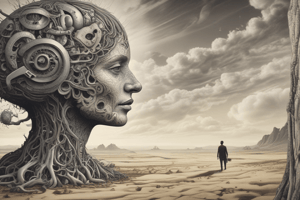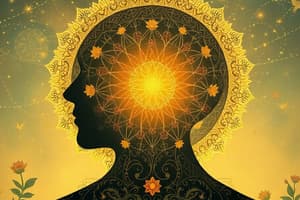Podcast
Questions and Answers
What is awareness?
What is awareness?
It is when you are able to monitor the information from your environment and from your own thoughts.
What does it mean to be in a state of moderate consciousness?
What does it mean to be in a state of moderate consciousness?
When we sleep and dream, we are moderately conscious.
Which of the following best describes wakefulness?
Which of the following best describes wakefulness?
- A mental state of deep relaxation
- Being fully aware of external and internal stimuli
- The degree of alertness reflecting whether a person is awake or asleep (correct)
- A state of complete unconsciousness
What is a flow state?
What is a flow state?
What characterizes minimally conscious state?
What characterizes minimally conscious state?
Which is considered a disorder of consciousness?
Which is considered a disorder of consciousness?
What is selective attention?
What is selective attention?
What factors influence attentional control?
What factors influence attentional control?
What best describes inattentional blindness?
What best describes inattentional blindness?
What is the cocktail party effect?
What is the cocktail party effect?
What is the impact of digital distractions on attention?
What is the impact of digital distractions on attention?
What does cognitive load refer to?
What does cognitive load refer to?
Flashcards are hidden until you start studying
Study Notes
Consciousness
- Awareness is being able to monitor information from your environment or your thoughts.
- Wakefulness is the degree of alertness, reflecting whether a person is awake or asleep.
- Full Consciousness is a state of being fully aware of your surroundings.
- Moderate Consciousness is a state of consciousness between full consciousness and a complete lack of consciousness such as when sleeping or dreaming.
- Minimal Consciousness is a state of consciousness where the individual is unresponsive to stimuli.
- Coma: a state of unconsciousness where the eyes are closed and the person is unresponsive and unarousable.
- Vegetative State: a state of minimal consciousness where the eyes might be open, but the person is otherwise unresponsive.
- Minimally Conscious: a state where a patient shows signs of intentional behavior, such as visually tracking a person, but cannot communicate.
- Flow State: A mental state where you are completely absorbed and involved in your actions. (Being "In the Zone").
- Mindfulness: A heightened awareness of the present moment, whether of events in one’s environment or one’s own mind.
Attention
- Attention is the limited capacity to process information that is under conscious control.
- Selective Attention is the ability to focus awareness on specific environmental features while ignoring others.
- Sustained Attention is the ability to maintain focused awareness of a target or an idea.
- Inattentional Blindness is a phenomenon where individuals fail to notice obvious, but unexpected objects or events in their visual field when their attention is engaged with another task.
- Cocktail Party Effect is the ability to focus one's attention on a particular stimulus while filtering out a range of other stimuli.
- Attention Control is the ability to focus on a task and ignore distractions.
- Factors such as fatigue, stress, and emotional state can influence attentional control.
- Digital Distractions: Studies have shown that the constant availability of smartphones, social media, and other digital devices can disrupt attention and make it easier for people to become distracted.
- Cognitive Load: Engaging in demanding cognitive tasks can deplete cognitive resources, making it more challenging to maintain focus and resist distractions.
Training Consciousness: Meditation
- Meditation can improve attention, mindfulness, and awareness.
Studying That Suits You
Use AI to generate personalized quizzes and flashcards to suit your learning preferences.




